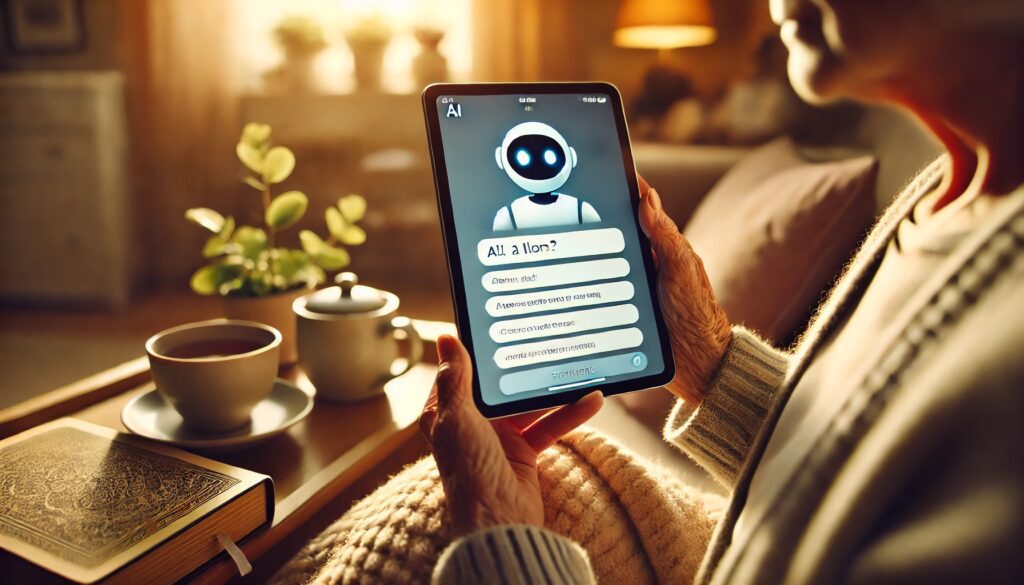
AI chat tools are becoming invaluable for enhancing elderly care. From easing day-to-day routines to offering companionship, these digital assistants are reshaping how seniors live, connect, and feel secure in their independence.
Understanding AI Chat’s Role in Elderly Care
What Is AI Chat for Elderly Care?
AI chat technology combines artificial intelligence with natural language processing to create interactive, conversational tools. For seniors, this means personalized support is available at any hour. These tools can perform practical tasks, answer questions, or simply engage in friendly conversations. Devices like Amazon’s Alexa, Google Assistant, and specialized platforms provide voice-activated or text-based chat that’s tailored for ease of use by elderly individuals.
Why AI Chat Matters for Seniors
Aging often means navigating health challenges, loneliness, and limited mobility, all of which can lead to feelings of isolation or helplessness. AI chat tools are designed to enhance seniors’ independence, not just by offering assistance but by making daily life feel more manageable. These tools encourage seniors to stay involved in their daily activities and feel a sense of control, reducing the chances of loneliness or dependency.
How AI Chat Supports Independent Living
Independence is essential to a senior’s quality of life. AI chat tools can remind seniors about medication schedules, help them locate items, or call for help if needed. They can also provide updates on weather, local news, or even book rides. The immediacy of support boosts their confidence in handling everyday tasks and lets family members know that their loved one has a reliable, accessible aid.
Addressing Loneliness with Companionship
While no AI can replace human warmth, AI chat tools offer companionship through casual conversations. They’re designed to understand and respond to a person’s tone, adjusting their answers to feel friendlier. Over time, these chats can give seniors a feeling of regular social interaction, especially if they’re unable to go out frequently. This companionship aspect has become one of the most valued attributes of AI chat in elderly care.
Benefits of AI Chat for Seniors’ Mental and Emotional Health
Providing Constant, Friendly Interaction
Social isolation can lead to a decline in mental health, particularly in seniors. AI chat tools are there 24/7, providing consistent interaction and helping reduce feelings of isolation. Whether chatting about daily news or reminiscing on past memories, these tools offer a friendly “voice” that becomes a part of daily life for many seniors.
Promoting Cognitive Engagement
AI chats can serve as mental exercises, sparking memory recall and encouraging cognitive engagement. Seniors can ask questions, play trivia games, or even practice new languages through these tools. These kinds of interactions help keep the brain active and provide seniors with enjoyable, brain-stimulating activities that can positively impact cognitive health over time.
Encouraging Daily Routines
Many AI chat tools come with customizable reminders for taking medications, drinking water, and completing daily activities. These gentle prompts help seniors stick to routines, which can be especially beneficial for those with mild memory challenges. The AI can also track patterns and adjust suggestions based on daily habits, making it easier for seniors to develop and maintain a healthy structure.
Offering Calming Reassurance
An AI chat tool can offer reassurance during anxious moments, such as confusion over lost items or worry over missed appointments. By simply asking for help or information, seniors receive instant responses that help ease stress. This reassurance is especially comforting for those with conditions like mild dementia, where forgetfulness can be upsetting.
Practical Applications of AI Chat in Daily Activities

Medication Reminders and Health Monitoring
Missing a medication dose can have serious consequences for elderly individuals. AI chat tools can remind them at set times, and some even integrate with wearable devices to track heart rate, blood pressure, and sleep. These tools are capable of notifying family members or healthcare providers if any irregularities are detected, adding a layer of safety.
Coordinating with Caregivers and Family
AI chat systems are equipped to seamlessly connect seniors with their caregivers or family members. For example, if a senior needs assistance, they can voice this to the AI, which can then notify a designated person. This connectivity is essential for seniors who live alone but still need easy access to help. Many tools even allow families to schedule regular check-ins, ensuring seniors feel connected and supported.
Guiding Leisure Activities and Social Events
Maintaining an active social life can be challenging for seniors with limited mobility. AI chat tools can bridge this gap by suggesting local events, connecting to online social groups, and even hosting virtual “hangouts.” For example, an AI can remind a senior about a weekly virtual book club or family video call. It keeps seniors socially engaged, even if they’re physically distant.
Emergency Assistance and Safety Features
For elderly individuals, emergency assistance can be lifesaving. Many AI chat devices have emergency features that allow seniors to call for help with a simple voice command. This capability provides peace of mind for seniors and their families, ensuring that support is only a word away if something goes wrong. This safety net encourages independence without sacrificing security.
How AI Chat Can Improve Family Relationships for Seniors
Keeping Families Updated and Involved
Families often worry about their elderly loved ones, especially those who live alone. AI chat tools can provide families with periodic updates on daily routines, activity levels, and overall wellbeing. By receiving these updates, family members can feel more connected and reassured about their loved one’s day-to-day health and safety, even if they aren’t physically present.
Facilitating Seamless Communication
An AI chat tool can simplify communication between seniors and their families. For instance, some tools allow seniors to dictate messages or initiate video calls simply by asking the device. These intuitive features mean that elderly individuals, especially those with limited tech experience, can stay easily connected to family members, reducing feelings of loneliness.
Enhancing Shared Experiences
AI chat tools can also bring families together for shared experiences. Through reminders about family birthdays, anniversaries, or other important events, these tools help seniors stay engaged with family milestones. Some tools even support photo sharing, helping seniors feel present in their families’ lives by seeing recent pictures and hearing updates.
Supporting Caregiver Needs
AI chat tools can assist caregivers by taking on certain reminders and tasks. For example, caregivers might use AI to help monitor medication adherence or daily activity levels, freeing up time for more personal interactions. This not only relieves caregivers from some daily pressures but also improves the quality of their interactions with seniors, as their time can focus more on companionship and care.
The integration of AI chat for elderly care opens doors to a world where seniors are empowered to maintain their independence, connect with others, and find meaningful ways to stay mentally and emotionally active. While no technology can replace human touch, the support, companionship, and reassurance offered by these tools create a bridge to a more fulfilling life for our aging loved ones.
Enhancing Mental Well-being with Personalized Engagement

Conversational Memory and Familiarity
Many AI chat tools have advanced memory capabilities, allowing them to recall details from past conversations. For seniors, this creates a feeling of familiarity and personal connection. When an AI remembers details like a pet’s name or a favorite hobby, it adds a personal touch that makes conversations feel warmer and more engaging. This sense of being “known” can greatly benefit elderly individuals who may feel overlooked in their daily lives.
Reducing Anxiety with Predictive Assistance
AI chat tools can learn a senior’s daily patterns, like regular meal or rest times, and prompt them to stay on track without the need for family reminders. This predictive assistance helps reduce anxiety, particularly for seniors who may feel frustrated by memory lapses. By acting as a “memory helper,” AI can foster a calm environment where seniors feel supported rather than dependent.
Boosting Mood Through Positive Reinforcement
Many AI chat tools are designed to offer encouragement, support, and even affirmations. For example, a simple “You’re doing great!” after a task or a cheerful greeting each morning can boost a senior’s mood. Studies show that positive reinforcement can improve mental well-being and encourage activity engagement, making AI chat tools effective companions for improving seniors’ overall mental health.
Limitations and Considerations of AI Chat in Elderly Care
Recognizing Privacy Concerns
AI chat tools collect data to personalize interactions, but privacy is a significant concern. It’s crucial that users and their families understand what data is collected and how it is stored or shared. Some seniors may feel uncomfortable with the level of monitoring involved, so choosing AI tools with transparent, secure data practices is essential for peace of mind.
Navigating Technical Challenges
While AI chat tools are designed for ease of use, technology can still be intimidating for seniors. Family members may need to provide initial setup support or training, and regular updates might be confusing for those less tech-savvy. Some devices may also require reliable internet connections, which can be a barrier for certain seniors.
Avoiding Over-reliance on AI for Social Interaction
Although AI offers valuable companionship, it’s not a replacement for human interaction. Over-reliance on AI chat tools for social needs can lead to an unintentional isolation, where seniors interact with family and friends less. Balancing AI’s role as a supplement to, rather than a substitute for, social interaction is crucial to ensure seniors still feel connected to their loved ones.
The Future of AI Chat in Elderly Care

Advances in Emotional AI
Future AI chat tools may become even more emotionally attuned, recognizing subtle cues like tone of voice, pauses, and changes in language to detect emotions. This emotional intelligence could allow the AI to respond more compassionately, adapting its responses based on the senior’s mood. For example, if a senior sounds upset or confused, the AI might suggest calling a family member or offer calming reassurances.
Integration with Health Monitoring Systems
As AI technology progresses, it’s expected to integrate seamlessly with wearable health devices and home monitoring systems. This could enable AI chat tools to track health indicators in real-time and provide relevant guidance or alerts when a senior’s health data shows abnormalities. This kind of integration could make AI chat tools invaluable as a part of remote health care and emergency response systems.
Expanding Social and Recreational Capabilities
Future AI advancements may also include expanded features for social engagement, like interactive storytelling, personalized music or art therapy, and access to virtual reality experiences. These tools could allow seniors to travel the world virtually, engage in immersive social gatherings, or even learn new skills like cooking or painting. These recreational features would enrich the lives of seniors by providing endless new activities.
Concrete Use Cases
Daily Medication Reminders and Tracking
Imagine a senior named Carol who lives independently but sometimes forgets her medications. An AI chat tool can be programmed to remind Carol at specific times each day to take her medication. With a friendly voice prompt, it says, “Carol, it’s time for your blood pressure medication.” If she doesn’t respond, the AI can send a notification to her caregiver, ensuring she doesn’t miss a dose. This setup helps Carol stay on top of her health routine without relying on family members for reminders.
Managing Health Conditions with Real-Time Alerts
John has a heart condition and wears a smartwatch that monitors his heart rate and activity. His AI chat assistant is integrated with this device, allowing it to track health data in real-time. When the device detects an irregular heartbeat, the AI tool prompts John with a calming voice, “John, I noticed your heart rate is elevated. Would you like to contact a family member?” This quick alert enables immediate action, providing peace of mind to John and his family.
Companionship and Conversation for Social Connection
Evelyn, a widow in her 80s, spends much of her day alone. Her AI chat tool engages her in friendly conversations, sharing news updates, discussing weather forecasts, or even prompting her to reminisce about past memories. The AI asks questions like, “Evelyn, would you like to tell me about your favorite holiday memory?” This interaction provides a daily dose of companionship, easing feelings of loneliness and helping Evelyn feel more connected.
Emergency Assistance with Hands-Free Calling
Bob has limited mobility due to arthritis, making it difficult to reach his phone in an emergency. His AI chat tool is equipped with hands-free calling, so if he falls or feels unwell, he only needs to say, “Help, call my son.” The AI instantly contacts his son, alerting him to check in on Bob. This quick, hands-free access to emergency assistance gives Bob greater independence while ensuring he can get help when he needs it.
Enhancing Family Connections Through Reminders and Shared Media
Maria’s family lives far away, and she occasionally forgets important dates like birthdays or family calls. Her AI chat assistant reminds her, “Maria, it’s your granddaughter Emma’s birthday today!” It also allows Maria to video call her family with a simple voice command, making it easy for her to stay in touch. Additionally, her family shares photos through the AI platform, allowing Maria to see recent pictures and feel included in family moments, even from afar.
Daily Routine and Wellness Reminders
Frank, an active senior, uses his AI chat tool for daily wellness reminders. Each morning, it encourages him to drink water, prompts him to take short walks for exercise, and even suggests brain games for cognitive health. The AI might say, “Frank, would you like to play a memory game today?” This support helps Frank maintain a structured day filled with health-promoting activities, allowing him to stay physically and mentally engaged.
Reducing Anxiety with Calming Support
Ruth has mild dementia and often feels anxious when she misplaces things. Her AI chat tool provides calming support, guiding her through finding lost items or soothing her with relaxing music. If she says, “I can’t find my glasses,” the AI can respond, “Let’s think, Ruth. Did you check near the living room chair?” This reassuring interaction helps Ruth manage her anxiety and feel a little more in control.
Cognitive Engagement Through Fun, Interactive Games
Sam, who enjoys staying mentally active, uses his AI assistant for daily cognitive challenges. The AI engages him in trivia questions, word games, and even historical quizzes tailored to his interests. It might say, “Sam, would you like to try a new geography quiz?” These activities keep Sam’s mind sharp, providing a fun and interactive way to exercise his cognitive skills regularly.
AI chat tools offer seniors an empowering combination of independence, companionship, and support. While challenges remain, the growing potential of these tools means they’re quickly becoming essential to elder care strategies, allowing seniors to live with greater dignity, connection, and peace of mind. The future of AI in elderly care holds promising possibilities, making the journey of aging a bit less daunting and a lot more fulfilling.
FAQs
Are AI chat tools safe for elderly individuals to use?
Yes, AI chat tools are generally designed with safety in mind, especially those intended for elderly care. Many offer emergency response features, such as the ability to call for help with a simple command. However, it’s essential to choose tools from reputable providers with strong data privacy and security practices, as these devices often collect personal information to function effectively.
Can AI chat tools remind seniors about medication and appointments?
Absolutely. Many AI chat tools offer reminders for medication, appointments, and other essential daily activities. Seniors or their caregivers can set up these reminders so that the tool provides gentle prompts at the scheduled times, helping seniors stay on track with their routines and health needs.
Do seniors need a lot of technical skills to use AI chat tools?
Not at all. Most AI chat tools are designed to be user-friendly and require minimal technical know-how. Many respond to voice commands, so seniors only need to speak naturally to interact with them. However, initial setup may require assistance from family members or caregivers to ensure everything is tailored to the senior’s needs.
Can AI chat tools recognize emotions or changes in mood?
Some advanced AI chat tools are designed to recognize emotional cues, like tone of voice or choice of words. These tools can adapt their responses to show empathy or offer calming reassurance when they detect signs of frustration, sadness, or confusion. While still evolving, this feature adds a layer of emotional support that can make interactions feel more human and compassionate.
Are there privacy risks associated with AI chat tools?
Yes, privacy is an important consideration. AI chat tools often collect data to personalize interactions, which raises privacy concerns, particularly for elderly users. Many reputable AI tools now include strict data security measures and allow users to adjust privacy settings. Choosing a trusted provider and understanding data practices can help families protect their loved ones’ privacy.
Do AI chat tools work with other health monitoring devices?
Many AI chat systems are compatible with health monitoring devices, such as wearable trackers for heart rate, blood pressure, or sleep patterns. When integrated, these tools can track health data in real-time, alerting caregivers or family members to irregularities. This integration is helpful for seniors who require regular health monitoring but want to maintain their independence.
Can AI chat tools help seniors stay connected with family?
Yes, AI chat tools make staying in touch easier by allowing seniors to make calls, send messages, or join video chats through voice commands. Some even offer reminders for family birthdays or upcoming visits. This ease of communication helps seniors feel more connected and engaged with their families, especially when distance is a barrier.
How customizable are AI chat tools for individual needs?
AI chat tools are highly customizable, allowing seniors or caregivers to set up specific reminders, select communication preferences, and tailor interaction styles. Some tools offer options for adjusting voice tone or language to match the senior’s preferences. This flexibility makes AI tools adaptable to different personalities, cognitive abilities, and lifestyle needs.
Resources
Organizations and Support Networks
- AARP (American Association of Retired Persons)
AARP offers resources and advice for seniors and families, including information on tech solutions for aging adults. They provide insights on digital tools that support independence and help reduce social isolation.
Visit AARP’s website - National Institute on Aging (NIA)
Part of the U.S. Department of Health and Human Services, the NIA provides extensive resources on healthy aging, cognitive health, and tech innovations like AI chat tools. Their research helps families make informed decisions about elderly care.
Learn more at the NIA - Aging 2.0
Aging 2.0 connects caregivers, innovators, and organizations to improve the lives of older adults through technology. They offer events, publications, and a supportive network for those interested in using AI and other tech for elderly care.
Visit Aging 2.0’s website